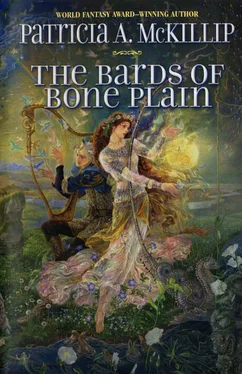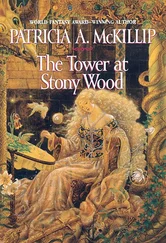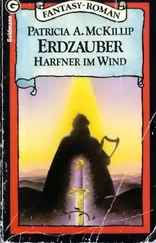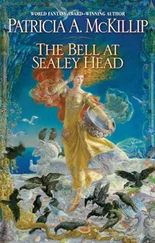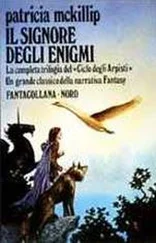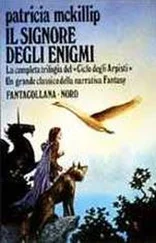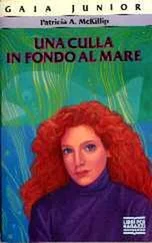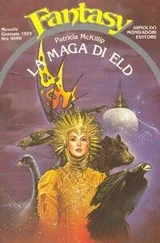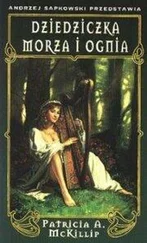“You are also at the school, I believe?”
“I am,” Phelan answered, sounding like Jonah at his most arid. “But I have no ambitions and no interest at all in trying to fill Quennel’s boots. He is a very great bard, an example to us all, and I can only wish him to keep playing for the Peverell kings as long as he himself wishes.”
“Which would be,” Quennel added, smiling, “until I draw my final breath between lines and leave one last verse unsung to haunt these old stones forever.”
“Admirable,” Kelda said with enthusiasm, and stopped a tray of toast points bearing minute molds of salmon, with capers for eyes. “We can all learn from your example.”
“You see,” Quennel began affably, and paused to pop a salmon into his mouth before he continued. He swallowed, paused again, swallowed again. Beatrice, working on her own fish, saw his face flush the hue of well-cooked salmon, then of uncooked beef. She nearly inhaled her own bite. Jonah said something sharply to Quennel, who was beginning to sag oddly against the startled Zoe. She struggled to hold him upright. As he slid, Jonah threw out his arm; it struck the old man hard below his ribs. The wine in Jonah’s hand splashed all over Quennel, and the salmon flew out of him like the final word on the subject before he slumped to the floor at their feet.
Given the mysterious nature and gifts of the bard who honored King Oroh’s court and sat at his right hand at councils, the king had handed Declan a conundrum. Declan had replaced himself, the first time, with someone he already knew and trusted, a skilled musician, presumably with the kinds of talents Oroh expected. This bard had also traveled in the king’s company from their native land. The court chronicler’s notes on the matter indicate that the bard’s sudden and completely unexpected death was indeed a stunning loss for the king. In his own land, the bard might have been easily replaced. In the new Kingdom of Belden, bards were trained far differently, and what King Oroh had come to expect in his Royal Bard simply did not exist. “The young bard left no one in this wild country to replace him,” the chronicler wrote. “King Oroh has no choice but to summon Declan back to him if he can find no other of such necessary skills.”
What exactly were these “necessary skills”?
Either they were kept secret, or alluded to between the lines, or everyone so easily recognized them that there was no need for explanation. Any of these are possible, since nobody ever explained why a gifted bard native to any of the five lost kingdoms would not have suited Oroh as easily. References are made to Declan’s unusual powers, both in historical records and in ballads. But in records, the references are brief, subtle, and sometimes barely there.
“The mist that flowed that third day over the adversary [at the Battle of the Welde] Declan raised with his skills, and thus was the King of the Marches brought low.”
Is Oroh’s chronicler actually telling us that Declan raised a fog that blinded only King Anstan’s army?
If so, such gifts that died with Oroh’s latest bard must have been extremely difficult to replace. Indeed, the terse passage casts a glance askew at all of King Oroh’s victories, and explains, in some occult fashion, his swift, triumphant usurping of the powers of five kings. He anchored his fleet in the foggy waters of the Stirl in early spring; by the next spring he declared himself King of Belden.
The modern historian can only suspend disbelief and conclude that the king, requesting that Declan find a successor to a bard with like powers, must have been well aware of the extremely hard nut he handed to the aging bard to crack.
And back he came, her faithless love,
In the night from the village below.
She stood upon the tower above,
Heard him singing in the snow.
Hot tears spiraled down the ice,
Whittled it sharp as love and lack.
She called him once, she called him twice,
He heard the deadly crack.
He looked up and saw her eyes,
Then he felt the blow.
His heart’s blood froze around the ice,
Colder than the snow.
“BALLAD OF THE FAITHLESS BARD,” ANONYMOUS: POSSIBLY BY A STUDENT OF DECLAN’S
And so death was the seed planted in Declan’s mind that split and sent up a shoot that leafed and branched and finally flowered into the first bardic competition held in the Kingdom of Belden.
Before he announced it, even to his own students, he gathered the few who had been struggling over his twig-scratches and finally allowed them to see one another’s faces.
They met in one of the rooms that Declan occupied midway up the tower, in which he kept his instruments and counseled his students. The students, grateful for rugs and fur underfoot, huddled close to the fire and eyed one another with dour surprise. None in the mangy, winter-bitten lot seemed to emit any kind of particular brilliance; they all worked hard, played well, sang well, and seemed to have no inkling of what in any of the others had persuaded Declan that they should be included in his secret circle.
There were five: the handsome, arrogant, ivory-haired Blayse, son of a Grishold nobleman; the plump and earnest Drue, whose father was a wealthy merchant in Estmere; the lovely, lanky Shea, with her hard violet eyes and a horse’s tail of chestnut hair, whose father owned the village brewery; the angular scarecrow Osprey, whose father was steward in one of the great houses of what was once the southern kingdom of Waverlea; and Nairn the crofter’s son.
They encountered one another daily; none were particularly close, not even Nairn and Shea, who had shared a summer’s eve in passing, once, on a flowery riverbank. It seemed a very long time ago, Nairn thought, and in a green, warm, sweetly scented world long vanished from the plain. Shea, dripping with a cold, cast a brief, bleary glance in his direction and sniffed, maybe a comment, maybe not.
“My father taught me how to write,” she said, “to do accounts. But nothing ever like this.”
“Nobody taught me,” Nairn said. “I thought that this is how everyone writes.”
Blayse made a faint, rude noise. The pedantic Drue said solemnly, “I can understand how you could make such a mistake if you had never tried to write before. But you would have realized soon enough that you had run out of words. For instance, there would be, I think, no word for ‘innkeeper,’ or even ‘garden,’ such concepts being unimaginable to primitive people who did not differentiate between—”
“Or for ‘tavern,’ ” Osprey interrupted irreverently. “Or, for that matter, ‘beer.’ ”
“There have been hops grown on the plain for centuries, my father says,” Shea argued. “My father says—”
“Hops,” intoned Drue, “first came from the fields of Estmere. The art of growing them and making beer was brought to Stirl Plain long after the stones were raised.”
“My father—” Shea persisted stubbornly.
“The earliest people on the plain had no word for ‘beer.’ ”
“Well, they must have drunk something,” Osprey said. He appealed to the bard, who was at his table, rapidly writing twigs. “Master Declan—”
“I have in my company the most gifted and promising of all my students, and all you can find to talk about is beer?”
They looked at him, surprised: what else better in that bleak world?
He gave them his rare, faint smile and rose. “Here,” he said, passing lines of twigs written on parchment to each of them. “When you finish translating this, come and tell me what it means. It is the keystone of your art. Go,” he urged them gently, as they stared blankly at the lines, turned the papers helplessly on their heads and back again.
Читать дальше
